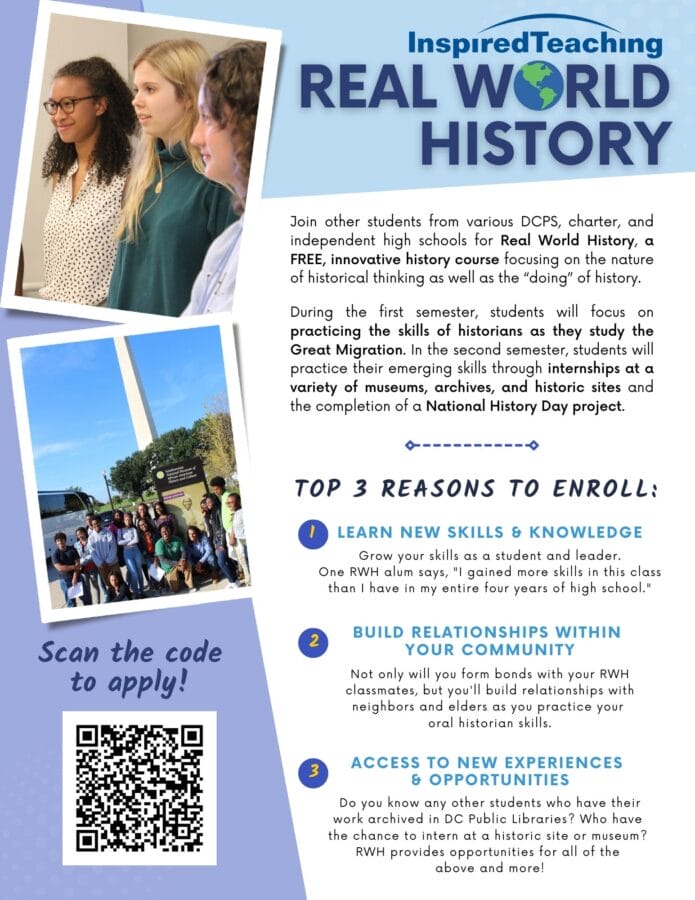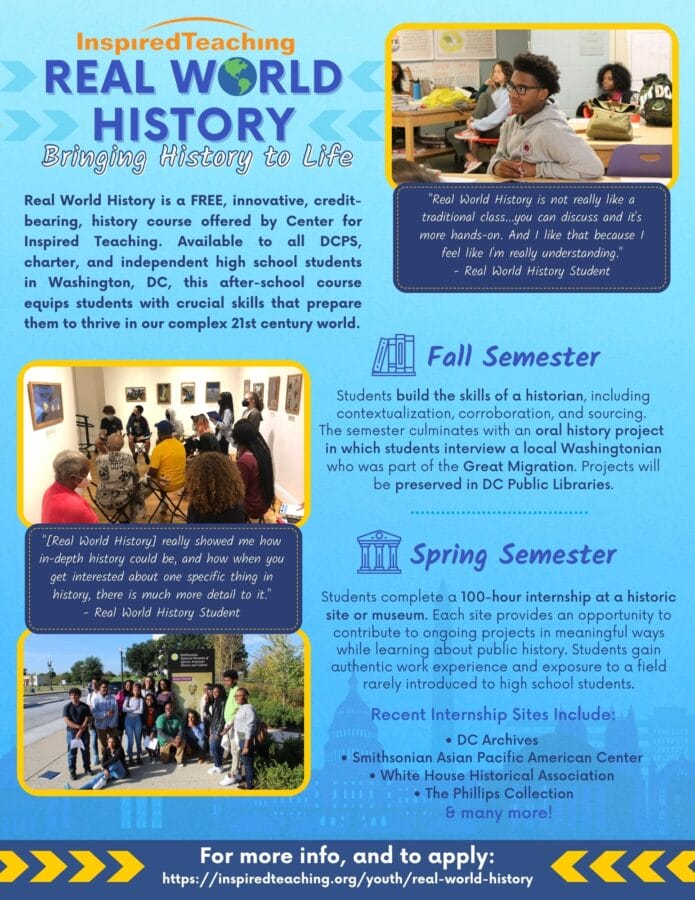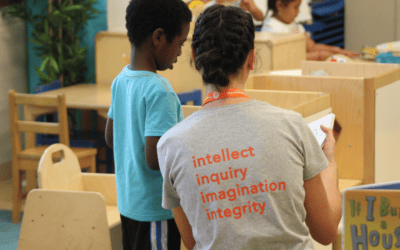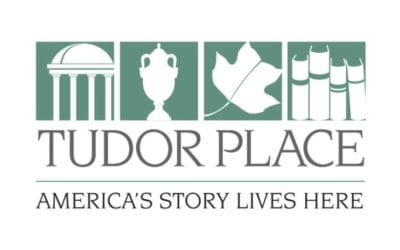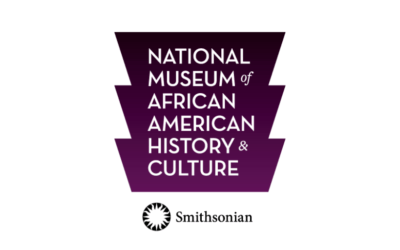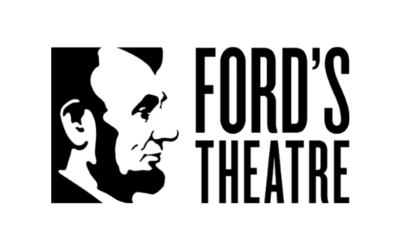Real World History
Bringing History to Life
Combining engaging, hands-on coursework with internships at historic sites around Washington, DC
The only credit-bearing course available to all public, public charter, and independent high school students in Washington, DC, Real World History teaches history through inquiry, equipping students with crucial skills that prepare them to thrive in our complex world.
Not in Washington, DC?
While the Real World History course is offered to high school students in and near Washington, DC, the Inspired Teaching lessons, strategies, and activities that make the program authentically engaging are not limited by geography! Find actionable insights educators everywhere can use to create classrooms where students — and teachers — thrive here.
Real World History focuses on the nature of historical thinking as well as the “doing” of history. During the first semester, students will meet after school with instructor Cosby Hunt of Inspired Teaching; they will focus on practicing the skills of historians as they study the Great Migration. In the second semester, students will practice their emerging skills through internships at a variety of museums, archives, and historic sites and the completion of a National History Day project.
First Semester: Building the Skills of a Historian
![]()
Students build the skills of a historian, including contextualization, corroboration, and sourcing. The class reads and discusses the award winning book The Warmth of Other Suns. The semester culminates with an oral history project in which students interview a local Washingtonian who was part of the Great Migration. Students complete projects involving first-hand documentation that are preserved in DC Public Libraries.
Listen to Real World History students’ oral history projects at the DC Public Library’s DIG DC archives!
Second Semester: Internships at Historic Sites
![]()
Students complete a 100-hour internship at a historic site or museum. Each site provides students with the opportunity to contribute to ongoing projects in meaningful ways while learning about public history, thereby gaining authentic work experience and exposure to a field that is rarely introduced to high school students.
Ask the Expert Interview Series
Due to Covid-19, the 2019-2020 class was unable to complete in-person internships. Out of necessity, the class transitioned to an online model and changed its focus. Real World History students conducted a series of online interviews with public historians to learn about their work. Recognizing the implications of the pandemic on institutions of public history, the students also asked their interviewees to discuss the short-term and long-term changes this health crisis would have on the field. Each Real World History student then wrote a reflective blog piece about their interview and the spring semester. Their unique insights offer readers a glimpse into the experience of high school students in the spring of 2020 and the inner workings of these institutions at a particular moment in history.
PreK – 12 Education Recommendations to Build an Engaged Citizenry
As a new administration takes office in Washington, DC, we recommend centering changes in education around the growth of Intellect, Inquiry, Imagination, and Integrity.
Tudor Place: Ask The Expert Interview Series
Elliott Levine, a 2019-2020 Inspired Teaching Real World History Student, interviews Bryn Cooley, Emily Rheault, and Lauren Rever of Tudor Place.
National Museum of African American History and Culture: Ask The Expert Interview Series
Amora Cambell interviews Paul Gardullo about the power of objects in the National Museum of African American History and Culture.
Ford’s Theatre: Ask The Expert Interview Series
Lola Rogin interviews Jake Flack about learning from Ford’s Theatre online.
Past Internship Sites Have Included:
Anacostia Community Museum
Charles Sumner Museum and [DCPS] Archives
Frederick Douglass National Historic Site
Ford’s Theatre
Freer|Sackler Museum of Asian Art
Library of Congress
National Archives and Records Administration
National Mall
National Museum of American History
National Museum of African-American History & Culture
National Museum of the US Navy
National Portrait Gallery
The Phillips Collection
President Lincoln’s Cottage
Smithsonian Asian Pacific American Center
Textile Museum
Tudor Place
United States Capitol Historical Society
White House Historical Association
Woodrow Wilson House
Host a Real World History Intern
Real World History students can offer valuable support to an internship site while gaining new skills and experience. Each internship site should provide a specific project or long-term task that the intern can work on throughout the semester. Students complete their 100-hour internships in January-May each year.
To inquire about hosting a Real World History student at your organization, email Cosby Hunt, Youth Program Director at Cosby@inspiredteaching.org
Standards Addressed by the Real World History Program
Common Core College and Career Readiness Anchor Standards for Language
Conventions of Standard English:
CCSS.ELA-LITERACY.CCRA.L.1 Demonstrate command of the conventions of standard English grammar and usage when writing or speaking.
Knowledge of Language:
CCSS.ELA-LITERACY.CCRA.L.3 Apply knowledge of language to understand how language functions in different contexts, to make effective choices for meaning or style, and to comprehend more fully when reading or listening.
Vocabulary Acquisition and Use:
CCSS.ELA-LITERACY.CCRA.L.4 Determine or clarify the meaning of unknown and multiple-meaning words and phrases by using context clues, analyzing meaningful word parts, and consulting general and specialized reference materials, as appropriate.
CCSS.ELA-LITERACY.CCRA.L.5 Demonstrate understanding of figurative language, word relationships, and nuances in word meanings.
CCSS.ELA-LITERACY.CCRA.L.6 Acquire and use accurately a range of general academic and domain-specific words and phrases sufficient for reading, writing, speaking, and listening at the college and career readiness level; demonstrate independence in gathering vocabulary knowledge when encountering an unknown term important to comprehension or expression.
Common Core College and Career Readiness Anchor Standards for Writing
Text Types and Purposes:
CCSS.ELA-LITERACY.CCRA.W.1 Write arguments to support claims in an analysis of substantive topics or texts using valid reasoning and relevant and sufficient evidence.
CCSS.ELA-LITERACY.CCRA.W.2 Write informative/explanatory texts to examine and convey complex ideas and information clearly and accurately through the effective selection, organization, and analysis of content.
CCSS.ELA-LITERACY.CCRA.W.3 Write narratives to develop real or imagined experiences or events using effective technique, well-chosen details and well-structured event sequences.
Production and Distribution of Writing:
CCSS.ELA-LITERACY.CCRA.W.4 Produce clear and coherent writing in which the development, organization, and style are appropriate to task, purpose, and audience.
CCSS.ELA-LITERACY.CCRA.W.5 Develop and strengthen writing as needed by planning, revising, editing, rewriting, or trying a new approach.
CCSS.ELA-LITERACY.CCRA.W.6 Use technology, including the Internet, to produce and publish writing and to interact and collaborate with others.
Research to Build and Present Knowledge:
CCSS.ELA-LITERACY.CCRA.W.7 Conduct short as well as more sustained research projects based on focused questions, demonstrating understanding of the subject under investigation.
CCSS.ELA-LITERACY.CCRA.W.8 Gather relevant information from multiple print and digital sources, assess the credibility and accuracy of each source, and integrate the information while avoiding plagiarism.
CCSS.ELA-LITERACY.CCRA.W.9 Draw evidence from literary or informational texts to support analysis, reflection, and research.
Range of Writing:
CCSS.ELA-LITERACY.CCRA.W.10 Write routinely over extended time frames (time for research, reflection, and revision) and shorter time frames (a single sitting or a day or two) for a range of tasks, purposes, and audiences.
Common Core College and Career Readiness Anchor Standards for Speaking and Listening
Comprehension and Collaboration:
CCSS.ELA-LITERACY.CCRA.SL.1 Prepare for and participate effectively in a range of conversations and collaborations with diverse partners, building on others’ ideas and expressing their own clearly and persuasively.
CCSS.ELA-LITERACY.CCRA.SL.2 Integrate and evaluate information presented in diverse media and formats, including visually, quantitatively, and orally.
CCSS.ELA-LITERACY.CCRA.SL.3 Evaluate a speaker’s point of view, reasoning, and use of evidence and rhetoric.
Presentation of Knowledge and Ideas:
CCSS.ELA-LITERACY.CCRA.SL.4 Present information, findings, and supporting evidence such that listeners can follow the line of reasoning and the organization, development, and style are appropriate to task, purpose, and audience.
CCSS.ELA-LITERACY.CCRA.SL.5 Make strategic use of digital media and visual displays of data to express information and enhance understanding of presentations.
CCSS.ELA-LITERACY.CCRA.SL.6 Adapt speech to a variety of contexts and communicative tasks, demonstrating command of formal English when indicated or appropriate.
Common Core College and Career Readiness Anchor Standards for Reading
Key Ideas and Details:
CCSS.ELA-LITERACY.CCRA.R.1 Read closely to determine what the text says explicitly and to make logical inferences from it; cite specific textual evidence when writing or speaking to support conclusions drawn from the text.
CCSS.ELA-LITERACY.CCRA.R.2 Determine central ideas or themes of a text and analyze their development; summarize the key supporting details and ideas.
CCSS.ELA-LITERACY.CCRA.R.3 Analyze how and why individuals, events, or ideas develop and interact over the course of a text.
Craft and Structure:
CCSS.ELA-LITERACY.CCRA.R.4 Interpret words and phrases as they are used in a text, including determining technical, connotative, and figurative meanings, and analyze how specific word choices shape meaning or tone.
CCSS.ELA-LITERACY.CCRA.R.5 Analyze the structure of texts, including how specific sentences, paragraphs, and larger portions of the text (e.g., a section, chapter, scene, or stanza) relate to each other and the whole.
CCSS.ELA-LITERACY.CCRA.R.6 Assess how point of view or purpose shapes the content and style of a text.
Integration of Knowledge and Ideas:
CCSS.ELA-LITERACY.CCRA.R.7 Integrate and evaluate content presented in diverse media and formats, including visually and quantitatively, as well as in words.
CCSS.ELA-LITERACY.CCRA.R.8 Delineate and evaluate the argument and specific claims in a text, including the validity of the reasoning as well as the relevance and sufficiency of the evidence.
CCSS.ELA-LITERACY.CCRA.R.9 Analyze how two or more texts address similar themes or topics in order to build knowledge or to compare the approaches the authors take.
Range of Reading and Level of Text Complexity:
CCSS.ELA-LITERACY.CCRA.R.10 Read and comprehend complex literary and informational texts independently and proficiently.
College, Career, and Civic Life (C3) Framework for Social Studies State Standards
| Dimension 1: Developing Questions and Planning Inquiries | Dimension 2: Applying Disciplinary Tools and Concepts | Dimension 3: Evaluating Sources and Using Evidence | Dimension 4: Communicating Conclusions and Taking Informed Action |
|---|---|---|---|
| Developing Questions and Planning Inquiries | Civics | Gathering and Evaluating Sources | Communicating and Critiquing Conclusions |
| Economics | |||
| Geography | Developing Claims and Using Evidence | Taking Informed Action | |
| History |
Collaborative for Academic, Social, and Emotional Learning Competencies
Self-Awareness: The abilities to understand one’s own emotions, thoughts, and values and how they influence behavior across contexts. This includes capacities to recognize one’s strengths and limitations with a well-grounded sense of confidence and purpose.
Self-management: The abilities to manage one’s emotions, thoughts, and behaviors effectively in different situations and to achieve goals and aspirations. This includes the capacities to delay gratification, manage stress, and feel motivation and agency to accomplish personal and collective goals.
Social awareness: The abilities to understand the perspectives of and empathize with others, including those from diverse backgrounds, cultures, and contexts. This includes the capacities to feel compassion for others, understand broader historical and social norms for behavior in different settings, and recognize family, school, and community resources and supports.
Responsible decision-making: The abilities to make caring and constructive choices about personal behavior and social interactions across diverse situations. This includes the capacities to consider ethical standards and safety concerns, and to evaluate the benefits and consequences of various actions for personal, social, and collective well-being.
Relationship skills: The abilities to establish and maintain healthy and supportive relationships and to effectively navigate settings with diverse individuals and groups. This includes the capacities to communicate clearly, listen actively, cooperate, work collaboratively to problem solve and negotiate conflict constructively, navigate settings with differing social and cultural demands and opportunities, provide leadership, and seek or offer help when needed.
FAQs
Will this course count for credit?
When and where will class meet during first semester?
Class will take place on Tuesday and Thursday evenings (5-7pm) at MLK Library (901 G St. NW).
How should students expect to travel to and from this afterschool class?
When will students know where their internship placements?
Will students be paid for their internships?
Will the class meet during second semester?
Will the course include culminating events?
Will there be work to complete prior to the first day of class?
Yes. Accepted students will read Wilkerson’s award-winning book, The Warmth of Other Suns. Mr. Hunt will provide assignments related to the reading for students to complete before the class meets for the first time. Students are also encouraged to visit some of the participating internship sites (details to follow).
How do I apply?
Mr. Hunt is an engaging teacher who makes learning fun for us. You can always access him, and that’s different. The workload really gets us prepared for college because of how critical he is about grading, which is really unique.

